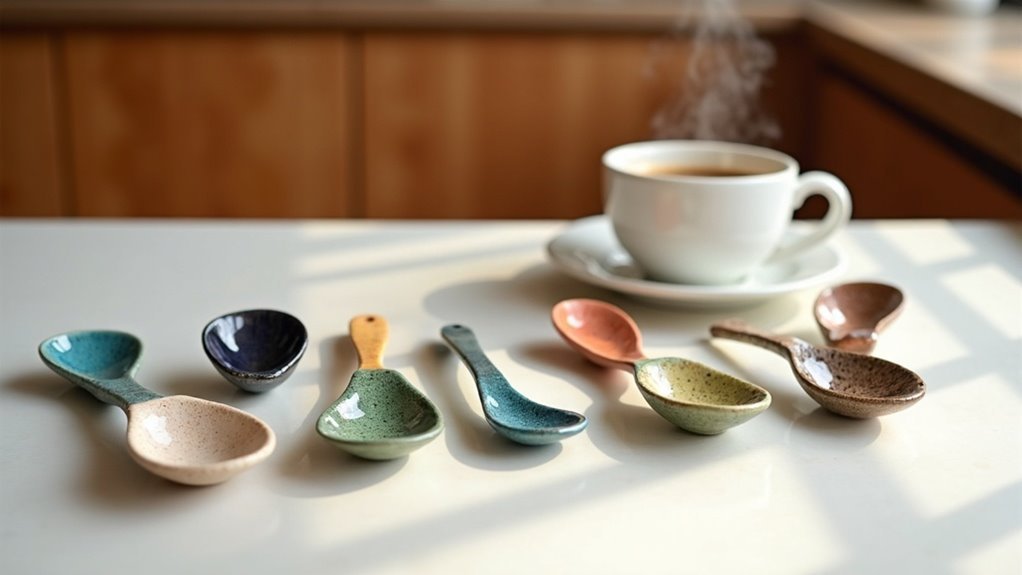Yes, coffee can significantly impact menopause symptoms. The caffeine in coffee may trigger hot flashes and heighten anxiety levels, intensifying daily challenges. As women age and experience hormonal changes, their sensitivity to caffeine can increase, potentially exacerbating sleep disturbances and discomfort. Many women find that reducing their coffee intake helps in managing these symptoms more effectively. If you’re interested in exploring alternatives and strategies to navigate this transition, there’s plenty of information available to help you feel your best while enjoying coffee.
Key Takeaways
- Coffee can trigger hot flashes and night sweats in menopausal women, with about 44% identifying caffeine as a symptom trigger.
- Aging and hormonal changes during menopause increase caffeine sensitivity, affecting individual responses to coffee intake.
- Moderate coffee consumption may provide mood and cognitive benefits but can also exacerbate anxiety and sleep disturbances.
- For those looking to manage menopausal symptoms, decaffeinated coffee can reduce risks while still providing a coffee-like experience.
- Exploring caffeine-free alternatives, such as herbal teas or roasted barley, can complement the coffee experience while helping to manage menopause symptoms effectively.
Caffeine’s Effects on the Body
When you consume coffee, its effects ripple through various systems in your body, particularly the central nervous system and cardiovascular system.
The caffeine found in coffee can increase blood pressure and heart rate, which may trigger vasomotor symptoms like hot flashes, especially in menopausal women.
As estrogen levels decline, the body’s response to caffeine can change, making some individuals experience heightened sensitivity.
If you’re going through menopause, be mindful of your coffee consumption, as it might exacerbate those uncomfortable symptoms.
Opting for decaffeinated coffee can help you enjoy your favorite beverage without the added risk of aggravating hot flashes or other menopausal symptoms.
How Caffeine Sensitivity Changes With Age
As you age, your body’s ability to metabolize coffee changes, often increasing your sensitivity to its effects.
Fluctuations in hormones during menopause can further impact how your body reacts to coffee, potentially exacerbating symptoms like hot flashes and anxiety.
It’s essential to monitor your coffee intake to maintain comfort and well-being during this change.
Hormonal Fluctuations Impact Sensitivity
Caffeine sensitivity changes as you age, largely due to hormonal fluctuations that affect how your body processes coffee.
As estrogen levels fluctuate during menopause, your coffee consumption might lead to heightened sensitivity, potentially exacerbating menopausal symptoms like hot flashes, anxiety, and sleep disturbances.
Postmenopausal women on hormone replacement therapy may metabolize caffeine more slowly, impacting their tolerance for coffee.
Aging also alters individual responses to caffeine, making it essential to evaluate your unique situation with coffee consumption.
Caffeine Tolerance Over Time
While you might’ve enjoyed your morning coffee without a second thought in your younger years, aging can markedly change how your body reacts to caffeine.
As you age, your metabolism slows, increasing your sensitivity to caffeine found in coffee. This shift is particularly notable in postmenopausal women, especially those on hormone replacement therapy, as estrogen levels influence caffeine metabolism.
You may find that your tolerance to coffee decreases, leading to stronger reactions after your favorite brew. Individual responses can vary widely, so it’s essential to monitor your coffee intake and its impact on menopause symptoms.
Understanding these changes can help you navigate your coffee consumption more effectively.
Does Caffeine Worsen Menopause Symptoms?
If you’re managing menopause and are a coffee enthusiast, you might wonder how caffeine from your favorite brew affects your symptoms.
Research indicates that caffeine can trigger hot flashes and night sweats for many women, with nearly half reporting it as a significant factor.
While that morning cup of coffee might temporarily boost your mood, it could also exacerbate your menopause experience, particularly if you’re facing more severe symptoms.
Caffeine and Hot Flashes
As you explore the world of coffee, it’s important to consider how your caffeine intake might influence your experience during menopause.
Research indicates that caffeine consumption is associated with an increase in the severity of hot flashes and night sweats among postmenopausal women. In fact, a study found that approximately 44% of women reported caffeine as a trigger for their menopausal symptoms.
Caffeine stimulates the sympathetic nervous system, leading to elevated blood pressure and core body temperature, which can exacerbate hot flashes.
While moderate coffee consumption may enhance mood for some perimenopausal women, those experiencing more severe postmenopausal symptoms might benefit from reducing their caffeine intake.
Mood Effects of Caffeine
Many women managing menopause find themselves questioning the role of coffee in their daily lives, especially regarding its impact on mood.
- Coffee can trigger mood swings and anxiety.
- It may exacerbate vasomotor symptoms like hot flashes.
- Limiting coffee might help alleviate severe menopausal symptoms.
While some perimenopausal women report improved mood with coffee, research shows it can activate stress hormones like adrenaline and cortisol, worsening anxiety.
Surprisingly, 44% of women identified coffee as a symptom trigger.
As a result, balancing coffee intake is essential for managing mood and overall well-being during menopause.
Consider how it affects your symptoms before reaching for that cup of coffee.
Can Caffeine Cause Hot Flashes?
Could your beloved morning cup of coffee be contributing to those uncomfortable hot flashes?
Research indicates that caffeine, found in coffee, can exacerbate vasomotor symptoms like hot flashes and night sweats in menopausal women. In fact, about 44% of women reported caffeine as a trigger for their menopause symptoms.
Research shows that caffeine can worsen hot flashes and night sweats, with 44% of women identifying it as a menopause trigger.
Caffeine activates the sympathetic nervous system, releasing stress hormones such as adrenaline and cortisol, which may ignite hot flashes for those already sensitive to them.
While some studies suggest that coffee may benefit mood in perimenopausal women, it might be wise for postmenopausal women grappling with severe symptoms to limit their coffee intake.
Consider your coffee habits carefully.
Can Caffeine Trigger Anxiety and Sleep Disruption?
How does coffee impact your mental well-being and sleep quality during menopause?
Coffee can disrupt your sleep patterns and elevate anxiety levels, especially if your intake is high. Consider these points:
- Moderate coffee consumption before bedtime can lead to increased sleep disturbances.
- Limiting coffee to at least nine hours before sleep may enhance sleep quality.
- Excessive coffee may activate your sympathetic nervous system, raising stress hormones like adrenaline.
These factors can exacerbate menopausal symptoms.
Because individual responses to coffee vary, it’s essential to monitor your intake to maintain better sleep and reduce anxiety during this changing phase.
Does Caffeine Affect Metabolism?
While you may not realize it, coffee can greatly influence your metabolism, especially during menopause. It stimulates the central nervous system, boosting energy expenditure and enhancing fat oxidation, which may help manage weight.
However, as you age, particularly postmenopause, your metabolism of caffeine found in coffee slows, leading to increased sensitivity. This sensitivity is tied to estrogen, as caffeine is processed by the same liver enzyme.
Moderate coffee consumption might improve metabolic health and lower BMI in postmenopausal women, but excessive intake could worsen menopausal symptoms like hot flashes and anxiety, prompting you to evaluate dietary changes for an ideal balance.
Decaf, Herbal Teas, and Other Coffee Alternatives
As you navigate the changes of menopause, exploring alternatives to traditional coffee can be beneficial for managing symptoms.
Navigating menopause? Exploring coffee alternatives may help manage your symptoms effectively.
Here are some coffee-related options to consider:
- Decaf coffee: With only 2-15 mg of caffeine, decaf offers a gentler choice while still providing that familiar coffee flavor you enjoy.
- Coffee alternatives: Consider beverages like roasted barley or chicory coffee, which can give you a similar taste experience without the caffeine.
- Cold brew: This method typically has less acidity and can be made with decaffeinated beans, making it a smoother option for sensitive stomachs.
Always consult your healthcare provider before trying new coffee alternatives or supplements to ensure they align with your individual health needs during menopause.
The Pros and Cons of Drinking Coffee During Menopause
Understanding the pros and cons of drinking coffee during menopause can help you make informed choices about your coffee habits.
While moderate consumption of coffee may enhance mood and cognitive function, it can also exacerbate menopausal symptoms like hot flashes and night sweats. Approximately 44% of women identify caffeine as a trigger for these discomforts.
Coffee’s caffeine content activates the sympathetic nervous system, which can escalate anxiety and sleep disturbances. If you’re struggling with severe symptoms, exploring alternatives like decaffeinated coffee or herbal coffee blends might be beneficial.
Balancing your coffee intake could lead to improved well-being during this transitional phase.








